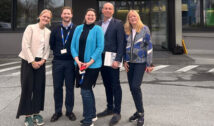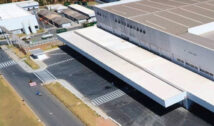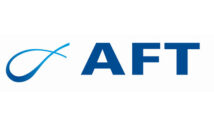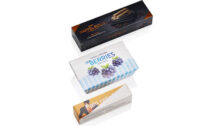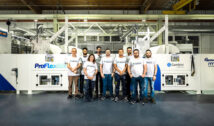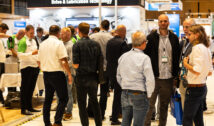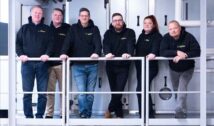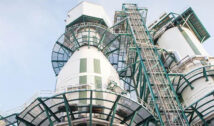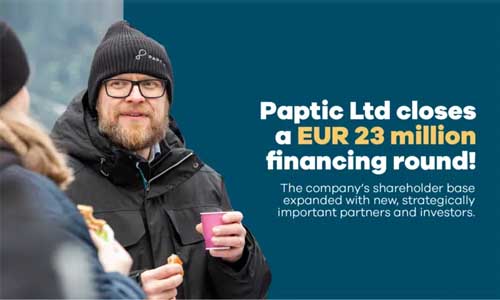
Paptic Ltd, a growth company manufacturing wood fibre-based packaging materials, has announced the raising of EUR 23 million in growth financing. The company’s shareholder base was expanded with new strategic partners and international equity investors: a German venture capital fund European Circular Bioeconomy Fund (ECBF) and a global water and hygiene solutions company Ecolab. Also, some of the company’s earlier shareholders, such as Japanese trade house Itochu Fibre Ltd., participated in this financing round. Besides the above-mentioned equity investments, Paptic was granted EUR 2.5 million by the European Innovation Council’s Accelerator program.
Paptic has also received a non-dilutive capital loan of EUR 10 million from the Finnish Climate Fund. This loan is specifically targeted at facilitating the development of the industrial scale-up of Paptic’s foam-based manufacturing technology.
The growth financing will support the development of the company’s product portfolio, production partnerships, and the availability of Paptic materials globally. The financing will also accelerate the industrial scale-up of Paptic’s foam-based manufacturing technology. Furthermore, the investment in growth supports the company’s target for carbon neutrality by 2030.
“Our rapid progress from a startup to a high-growth company, with Paptic materials in use by over 100 customers globally, has made us an appealing investment opportunity and we are delighted to welcome our new international investors to join us. A cornerstone of our operation is to work in accordance with the principles of circular economy, to this end, we support our customers to replace plastics in various flexible packaging applications”, says Tuomas Mustonen, CEO and co-founder of Paptic Ltd. “Expanding our global shareholder base was one of the targets of this round, and I am very satisfied with the outcome.”
EUR 100 million revenue in 2026
Paptic has more than doubled its revenue annually for four consecutive years. The company is heading to achieve a revenue of EUR 100 million in 2026 with its renewable and recyclable at-scale packaging materials that align with the circular economy principles.
Paptic’s new investor ECBF, the first venture capital impact fund exclusively dedicated to the bioeconomy and circular economy aiming to catalyze the transition towards a sustainable future, saw Paptic as a perfect fit for their portfolio.
“The versatile applicability of recyclable Paptic materials provides an excellent basis to reduce the use of fossil materials in packaging. Our investment will provide Paptic with the resources to accelerate its international expansion, as well as to serve the growing demand for innovative packaging materials”, comments Guillaume Gras, Investment Director at ECBF.
Ecolab, a global sustainability leader offering water, hygiene, and infection prevention solutions, is an excellent addition to Paptic’s shareholder base. The company’s focus on sustainable solutions, deep scientific expertise, and broad industry relationships provides business opportunities for both companies. Ecolab’s strong foothold in North America supports Paptic’s future expansion in that market.
“We are excited about the opportunity to support circularity through our investment in Paptic and its successful approach to sustainable packaging. Our shared vision of protecting our planet and its vital resources serves as a foundation for this partnership”, says Luis Pereira, Senior Vice President, and General Manager of Ecolab’s Nalco Water Paper Division. “Our expertise and broad offerings, combined with our global reach, will help expand Paptic’s opportunities for growth.”
Itochu, one of the largest Japanese general trading houses, invested in Paptic for the first time in the autumn of 2021. The successful cooperation and strong growth of Paptic attracted Itochu to increase its share in the company.
“We are thrilled to announce our ongoing support for Paptic as they embark on their journey towards further growth. Through our continuing support for Paptic, we actively contribute to their mission and pave the way for a more sustainable future. Together, we can empower both existing and new customers to make conscious choices and drive positive change in our efforts to protect the environment”, says Yuto Suzuki, General Manager of Itochu Europe Plc.
Finnish Climate Fund, a Finnish state-owned special-assignment company steering funding for combating climate change and boosting the low-carbon industry, committed a capital loan of up to EUR 10 million to Paptic to accelerate the development of the company’s foam-based manufacturing technology. “Paptic supports its customers to switch to renewable and recyclable raw materials. The Finnish Climate Fund’s mission is to accelerate the deployment of new solutions that have significant climate and environmental impacts, and high-grade biomaterials play an important role in this”, describes Toni Mikkonen, Climate Fund’s Director of Investments, regarding the funding decision.
“We are very happy that our work and solutions to reduce the use of fossil-based materials in flexible packaging are recognized as sustainable and commercially viable alternatives for today and tomorrow. With this funding, we will improve our market presence, sales network, and services to our customers. Additionally, this investment will enable us to further strengthen our sustainability performance and expertise, ensuring that we can exceed the requirements of our customers and tightening regulation”, says Tuomas Mustonen and concludes: “This growth investment will accelerate and support our goal to reach EUR 100 million of revenue in 2026 and attain carbon neutrality target by 2030.”
Global growth potential
The global flexible packaging market is estimated to be over EUR 200 billion annually, and 70 percent of the materials currently being plastics. In almost half of the end uses, plastic could be replaced with renewable and recyclable Paptic materials.
Many well-known electronics, fashion, and hygiene products brands, as well as fruit and vegetable packers, have already committed to switching from plastics to packaging solutions that fit to the circular economy principles. The transition emphasizes renewable raw materials from sustainable sources, recyclability at scale, and a low-carbon value chain. The shift is reinforced by recycling and climate targets in the EU and other markets.
The demand for replacing thin plastic films is global. In the upcoming years, Paptic will concentrate on strengthening its presence in Europe, accelerating growth in Asia, and exploring opportunities for market expansion into new areas like North America. The company’s growth strategy is supported by forecasts stating that the amount of packaging is still increasing due to economic and population growth. Without new innovative fibre-based solutions, a large part of the growth would come from plastic. To reduce the use of fossil-based materials in packaging, the use of resource-efficient materials that are both recyclable and made from renewable raw materials is the choice. Additionally, these materials should be compatible with the existing recycling streams, for example Paptic materials are recyclable with cardboard and packaging papers.



